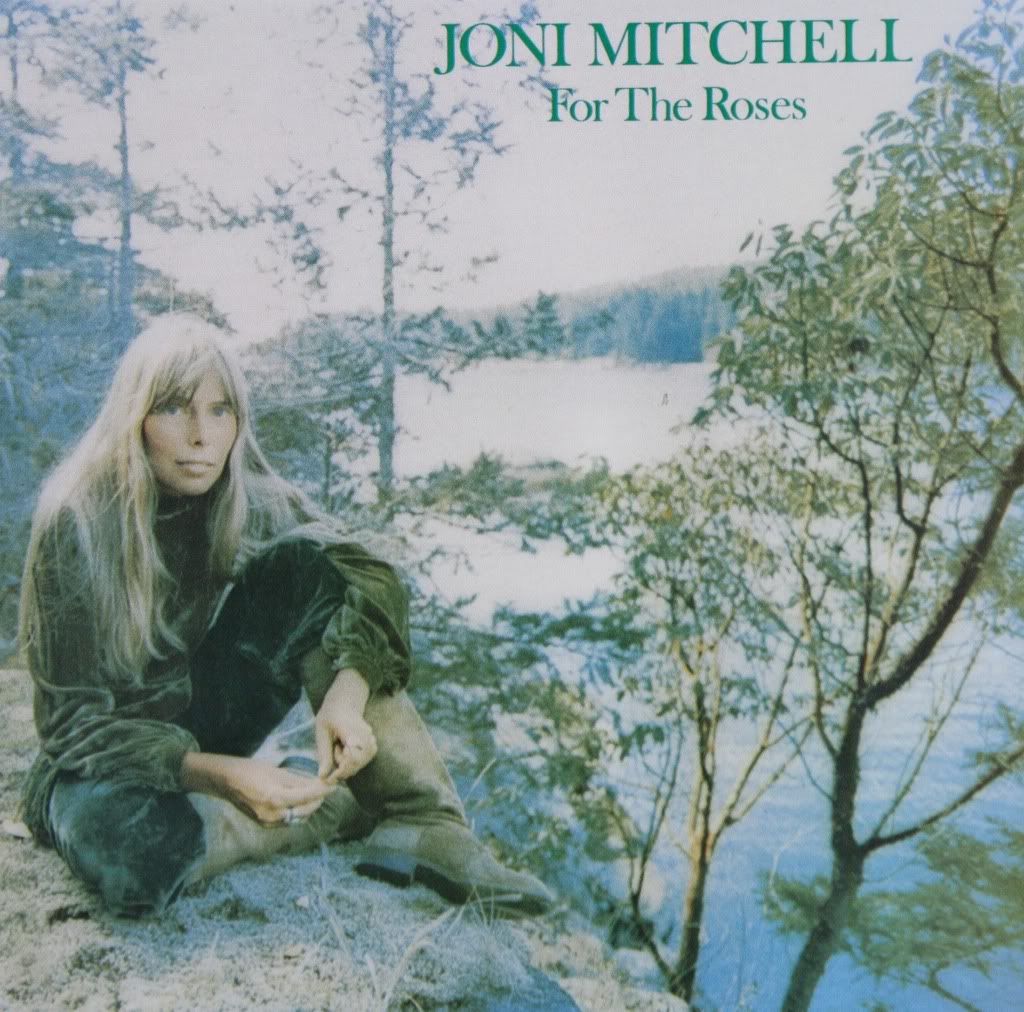If ever there were a transition album, it's got to be Joni's 1972 long-player, For the Roses. In almost every way, it straddles the line between her earlier folky roots and her later dive into jazzy pop, while never reaching the peaks that both eras achieved. Moreover, the album is a reminder of the delicate balance (since it's largely absent here) between all of Mitchell's different aspects that occurs on her best albums.
Attractive as the aforementioned combination between folky, acoustic Mitchell and slick, jazzy Mitchell might sound, the songs on For the Roses mostly fail to gel. In my opinion, it's mostly down to a dearth of good melodies and hooks. Although all classic Joni Mitchell albums seem to thrive on ear-shocking chord changes and surprisingly far-ranging melodies, For the Roses illustrates just how fine the line is between a novel, ear-surprising vocal melody and one that just sounds strange and is ultimately unmemorable. The inauspiciously preachy allegorical piano ballad opener, "Banquet," demonstrates this as good as any other tracks ("Lesson in Survival" and "See You Sometime" suffer similar fates)--the sounds that made "The Last Time I Saw Richard" such a haunting closer to Blue sound here like an artist looking for inspiration in uncommon chord progressions but not bothering to listen to hear if the results are compelling. And yet, we get to hear Mitchell experimenting with some of the deep vocal vibrato that she'd later put to great use on Court and Spark and The Hissing of Summer Lawns.
Similarly, we get the first appearance of the saxophone and flute arrangements that typify those next albums, but in a much more subdued and organic setting. The results are certainly sonically interesting, as on the wah-guitar, saxophone and synthesizer arrangements "Cold Blue Steel and Sweet Fire," the jazzy flute harmonies and bass clarinet of "Barangrill," and the tremulous vocal arrangements of "Electricity," among others. It's just a pity that none of these songs presents a melody or lyrical hook that Mitchell had already demonstrated she was capable of on her previous two albums. The latter, though, marks her turn toward the character sketches that would dominate her later 70's work, though it also heralds more preachiness directed toward the music industry, which we get in smaller doses here than on later albums.
Fortunately, it's not all bland--"For the Roses" is a nice mid-tempo acoustic guitar-based piece, while "You Turn Me On, I'm A Radio" calls down some much-needed catchiness in both words, structure and melody. "Blonde in the Bleachers" (especially the last 30 seconds) and "Judgment Of the Moon and Stars" aren't necessarily great tunes, but their neo-Mitchell arrangements reach lush and stimulating heights. Overall, For the Roses fails to impress particularly because of where it resides in the Joni Mitchell chronology. Perhaps Mitchell was contractually rushed into writing and recording the album when she didn't quite have many ideas fully fleshed out (sometimes it's better to wait until you have something to say before trying to say anything at all), or maybe the album just needed to happen in order for Joni Mitchell the artist to progress into what was to come. Either way, this album's mostly of interest to the already-converted and probably won't grab any newcomers.
You can get it on CD here


2 comments:
You don't get it.
I don't usually approve comments like this but made an exception since it's such a classic daft response to criticism of an album or artist--I'll officially dub it the "Butt-hurt Radiohead Fan Response." "You have a different opinion from me, therefore you just don't get it." Cathy, if you think I "don't get" For the Roses, I welcome your comments that respond to the specific points I made about what in the music didn't jive with my preferences and opinions of Joni's best work, or maybe some specifics that describe what you think is great about the album--I always welcome well-reasoned disagreement, and it would most likely enhance my appreciation of this album. As it stands, "You don't get it" is both a childishly reactionary response and a completely ineffective means to communicate what, exactly, it is that I "don't get." You must not have read the disclaimer before posting your comment!
Post a Comment